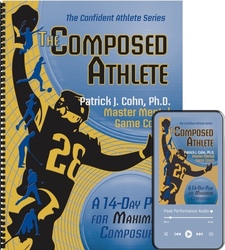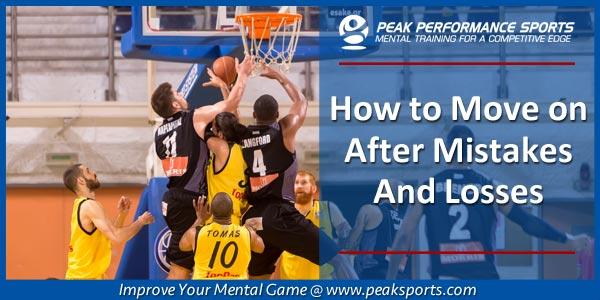The Importance of Letting Go of Past Games
Do you find it difficult to get over a bad game or a loss?
Do you rehash your performance over and over in your mind, beating yourself up over every little mistake?
If you or your athletes keep replaying mistakes in your mind, it chips away at your confidence and interferes with your ability to perform to your capabilities in the next game.
It is absolutely normal to be upset over a loss and mistakes. You shouldn’t feel that there is something wrong with you after you played less than your best.
The problem is when you can’t let go of those negative thoughts and feelings… Or when you start doubting your ability to perform in the present… Or ask yourself, “Why does this always happen to me?”
Prolonged negative reactions to bad play becomes a mental burden or a weight that weighs you down and interferes with your game.
Of course no athlete wants to remind themselves of mistakes, but if you don’t take proactive steps to “let go” of bad games, you are doomed to repeat those same mistakes in future games.
Letting go of the past is not simply a matter of forgetting the last game…
Letting go requires that you make a conscious choice where to place your focus.
By allowing the past to occupy your present, you double your opposition in the next game. Not only will you be competing against the other team, but you will also be battling the negativity you created in your own mind.
The goal is to focus on your next game with optimism. You want to assess your performance so you can improve your game, but not to dwell on mistakes and missed opportunities.
John Salley is a former NBA player who understands the key to longevity in sports. Salley is a 3-time NBA Champion winning with three different franchises in three different decades.
Salley commented, after the Cleveland Cavaliers lost Game 1 of the NBA Final to the Golden State Warriors, on how athletes need to move on after mistakes and losses.
SALLEY: “I didn’t read the newspaper when it came to sports. There is no reason to read the sports section if you are a professional athlete. They are writing about what you have already done, so there is no reason for you to rehash it. You are already rehashing your mistakes in your brain. It’s like being on Broadway, do your show, go home and back again and do it tomorrow.”
How to move forward after losing:
If you want to play your best in the present, you need to turn the page on the past.
To move forward, see the past game as a footnote in yesterday’s newspaper. Imagine yourself flipping the papers of yesterday’s news and refuse to review what happen yesterday.
The key is to objectively assess your performance or statistics so you can develop a future practice plan–without dwelling on your short comings or losing.
Related Sports Psychology Articles
- How to Break Free From Losing Streaks
- Finishing Strong When Losing
- Mental Toughness Strategies: Coping With Losing
*Subscribe to The Sports Psychology Podcast on iTunes
*Subscribe to The Sports Psychology Podcast on Spotify
Download a free sports psychology report to improve your mental game!
Learn more about our one-on-one mental game coaching.
The Composed Athlete

“The Composed Athlete” is presented on 80-minute Audio Programs with a 70-page step-by-step workbook that guides you through the program each day. It’s a complete system for conditioning your mind to have maximum composure in competition.
“The Composed Athlete” was developed for any level coach, parent, or junior to professional athlete who wants to improve performance and gain a competitive edge. It does not matter if you are a fledgling junior athlete; or a seasoned professional, plagued with distractions; or you just wanting to learn how to improve your composure…


